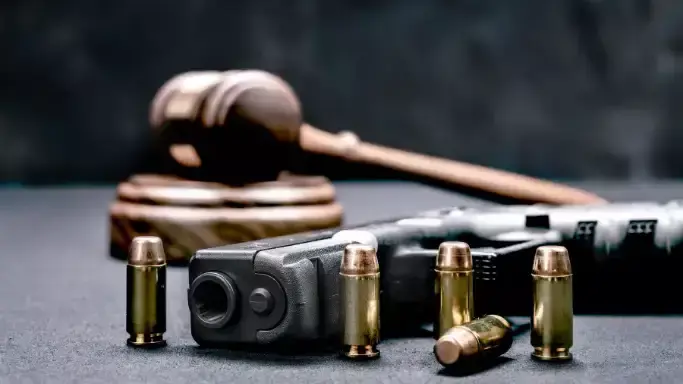Guns and Domestic Violence: Understanding the Lautenberg Amendment
Domestic violence is a grave concern that affects countless individuals, particularly women, in the United States. One alarming aspect of this issue is the use of firearms as tools of intimidation, injury, and even death in cases of domestic violence. To combat this, Congress passed the Lautenberg Amendment, also known as the Domestic Violence Offender Gun Ban, in 1996.
This amendment significantly altered the landscape of gun control laws in the country by prohibiting the possession of firearms by individuals convicted of misdemeanor domestic violence crimes. In this article on Guns and Domestic Violence, we will delve into the details of the Lautenberg Amendment, its implications, and how it impacts the safety of victims of domestic violence.
Understanding the Lautenberg Amendment
The Lautenberg Amendment, a crucial modification to the Gun Control Act of 1968, introduced strict regulations concerning the possession of firearms by individuals involved in domestic violence incidents. The key provisions of this amendment aim to keep guns out of the hands of potential abusers under the following circumstances:
1. Domestic Violence Convictions
One of the central aspects of the Lautenberg Amendment is its permanent ban on purchasing, owning, or using a firearm for individuals convicted of a felony or a misdemeanor domestic violence offense. A misdemeanor domestic violence crime typically involves:
- The use or attempted use of physical force (such as simple assault or assault and battery).
- The threatened use of a deadly weapon.
These offenses must occur within a close personal relationship, which can include current or former spouses, live-in intimate partners, individuals with a child in common, or dating partners. However, if the victim was a dating partner, and the parties never lived together, the offender can request to end the ban after five years, provided there have been no subsequent convictions for violent crimes.
2. Qualifying Restraining Orders
Another significant aspect of the Lautenberg Amendment is its restriction on individuals subject to a qualifying domestic violence restraining order or protection order. When such an order is in place, the person named in the order is prohibited from possessing or using firearms.
To qualify, restraining orders must meet specific criteria:
- The abuser must have a close personal relationship with the victim, which can include current or former spouses, parents or guardians, current or former live-in partners, or individuals in a dating relationship.
- The abuser must receive notice of the restraining order hearing, ensuring they have the opportunity to attend and participate. Ex parte court orders, where only one party is present, do not meet this requirement.
- The domestic violence protection order should specifically prohibit behavior that threatens or creates fear of physical injury, identifying the abuser as a threat to the victim’s or child’s physical safety.
It’s important to note that members of the military and state and local government workers who use firearms as part of their jobs are exempt from the Lautenberg Amendment’s provisions. However, even in these cases, restrictions may still apply under state laws.
Enforcement and Variation in State Laws
Federal domestic violence gun laws, such as the Lautenberg Amendment, take precedence over state laws. However, state domestic violence gun laws may vary significantly from one state to another. The National Network to End Domestic Violence provides resources to help individuals determine whether their state’s restraining order laws qualify for the federal gun ban.
Consequences of Violating the Domestic Violence Gun Ban
The consequences for maintaining gun ownership once convicted of violating the federal domestic violence gun laws can be severe. Violators may face fines, imprisonment, or a combination of both, with a maximum prison sentence of 15 years.
How Does the Government Keep Track?
Tracking individuals affected by the Lautenberg Amendment and other domestic violence-related firearm prohibitions is a complex task. The Giffords Law Center to End Gun Violence monitors statewide laws regarding the removal of guns from those who pose a threat to others’ safety.
Interestingly, only four states currently require the entry of misdemeanor domestic violence convictions into the federal database of the National Instant Criminal Background Check System (NICS). If your abuser was convicted of domestic violence in another state, you may need to contact the district attorney’s office in that state to confirm the conviction.
Additionally, state laws regarding the removal of firearms and ammunition from individuals with protective orders vary significantly. Some states allow police to take guns, while others permit designated third parties to receive the firearms. However, several states, including Alaska, Arizona, Connecticut, Indiana, Maryland, and Vermont, do not allow police to remove firearms.
Supreme Court Upholds Firearm Bans for Domestic Abusers
The Supreme Court has upheld federal laws prohibiting domestic abusers convicted of violent misdemeanors from legally purchasing or possessing firearms. In United States v. Castleman (2014), the Court ruled that even minor domestic assault charges can trigger the federal firearm possession ban for misdemeanor crimes of domestic violence to keep guns away from potentially dangerous abusers.
The Court affirmed that domestic violence misdemeanants can face firearm prohibitions if their offense involved physical force, viewing such restrictions as reasonable measures to prevent gun violence. In summary, the Supreme Court has ruled that banning domestic abusers convicted of violent misdemeanors from gun ownership under federal law is constitutional.
Taking Action
Given the variation in state laws and the complexity of the issue, individuals affected by domestic violence and the Lautenberg Amendment may need to seek legal assistance. Whether you are seeking protection or are subject to a restraining order, consulting with a local family law attorney can help you navigate the specific laws and regulations in your state.
The Impact of Recent U.S. Supreme Court Rulings
Recent U.S. Supreme Court rulings have brought the Second Amendment and firearm regulations into the spotlight. These decisions have clarified and expanded the rights of citizens to bear arms for self-defense. However, they have also raised questions about how these rulings intersect with domestic violence-related firearm prohibitions.
In District of Columbia v. Heller (2008) and McDonald v. City of Chicago (2010), the Supreme Court affirmed the individual right to keep and bear arms. More recently, in New York State Rifle and Pistol Association v. Bruen (2022), the Court overturned a New York state law related to concealed carry licenses.
However, a subsequent ruling in United States v. Rahimi (2023) by the Fifth Circuit Court of Appeals found that the firearm prohibition based on protection orders violated the Second Amendment. This ruling is currently applicable only in the Fifth Circuit states of Texas, Louisiana, and Mississippi. The U.S. Department of Justice plans to appeal the case to the U.S. Supreme Court.
Conclusion
The Lautenberg Amendment, also known as the Domestic Violence Offender Gun Ban, plays a crucial role in protecting the victims of domestic violence from further harm. While recent Supreme Court rulings have added complexity to the intersection of Second Amendment rights and domestic violence, the need to safeguard those at risk remains paramount. Understanding the laws and seeking legal assistance when needed is essential for those affected by domestic violence and firearm restrictions.
FAQs about (Guns and Domestic Violence)
- What is the Lautenberg Amendment?
- The Lautenberg Amendment, also known as the Domestic Violence Offender Gun Ban, is a federal law that prohibits individuals convicted of misdemeanor domestic violence offenses from purchasing, owning, or using firearms.
- What qualifies as a domestic violence misdemeanor crime under the Lautenberg Amendment?
- A domestic violence misdemeanor crime typically involves the use or attempted use of physical force or the threatened use of a deadly weapon against a person in a close personal relationship with the abuser.
- Can individuals under a restraining order possess firearms?
- No, individuals subject to a qualifying domestic violence restraining order or protection order are prohibited from possessing or using firearms.
- Do state laws regarding domestic violence gun bans vary?
- Yes, state laws regarding domestic violence gun bans can vary significantly, and federal laws take precedence. The National Network to End Domestic Violence provides resources to help individuals understand their state’s laws.
- What should I do if I need assistance with domestic violence-related firearm laws?
- If you require assistance or have questions about domestic violence-related firearm laws, it’s advisable to consult with a local family law attorney who can provide guidance tailored to your specific situation.



